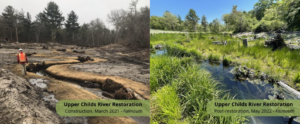BARNSTABLE – State officials recently announced $2.1 million in ecological grants restoring wetlands and rivers through the Department of Fish and Game, including almost $250,000 for regional projects.
The seven following grants were awarded to the Cape and Islands:
- The Buzzards Bay Coalition received $150,000 for the Mattapoisett Bog Restoration, which will be used to adaptively manage the newly restored wetlands, including the management of invasive plants.
- The Town of Yarmouth received $25,000 for the rehabilitation of 57 acres of former bogland and improved fish passage through the Upper Bass River Restoration.
- The Cape Cod Conservation District received $20,000 to support the design and planning for the Bayview Cranberry Bog Restoration, restoring 45 acres of former cranberry farmland.
- The Nantucket Conservation Foundation received $18,000 for the Windswept Cranberry Bog Restoration, restoring 40 acres of wetlands and connecting it to a larger 231-acre open space.
- The Chatham Conservation Foundation received $15,000 to aid in surveys being conducted for the Frost Fish Creek Restoration.
- The Association to Preserve Cape Cod received $14,000 for the Sesuit Creek Restoration, which will aim to restore tidal flow to 57 acres of salt marsh habitat through a culvert replacement.
- The Falmouth Rod & Gun Club received $6,200 to support invasive species management at the site of the Child’s River Restoration project.
“Restoring nature saves money and protects our communities. For every $1 spent on wetland restoration, over $7 is saved on disaster recovery costs,” said Energy and Environmental Affairs Secretary Rebecca Tepper. “These critical projects help our cities and towns build resilience to hazards like flooding, drought, and sea-level rise.”
“I know the selection process was competitive and I am very grateful to DER for focusing on our particularly fragile region,” said State Senator Julian Cyr (D-Truro). “These efforts,” he said, “will not only preserve the unique ecosystems that define our coastline but will also help protect our water quality, mitigate flooding, and ensure the next generation can enjoy the same natural beauty that I did growing up.”












